| |
|
|
| |
|
|

|
On Youth Day, Lebanese young people discuss innovation and sustainable development
On 8 August, 200 young Lebanese women and men, aged between 18 and 30, got together at ESCWA to mark International Youth Day under the theme “Youth Innovation for Lebanon’s Sustainable Development”.
The event focused on Gender Equality, Economic Empowerment and Reduced Inequalities. It also offered four separate workshops during which youth discussed interlinkages between innovation and the following themes: gender, economic empowerment, equality and development.
Participating youth in the workshops raised several proposals that can contribute to the implementation of the Sustainable Development Goals (SDGs), such as revamping the curriculum to include sustainable development courses, building new partnerships with the government and other parties, encouraging volunteerism, establishing electronic platforms to fight corruption, reducing the gap between education and labor market.
The event was jointly organized by the Ministry of State for Economic Empowerment of Women and Youth (EEWAY), the Ministry of Foreign Affairs (MoFA), the Office of the UN Resident Coordinator in Lebanon, and a number of UN organizations working in Lebanon.
Read more
|
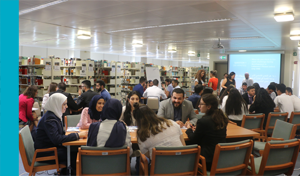 |
| |
|
|
 |
‘Political Tourism’ students visit ESCWA
Around 45 foreign students of Lebanese origin paid a visit to ESCWA on 2 August as part of a broader tour in Lebanon organized by the Ministry of Foreign Affairs under the framework of “Political Tourism” project. The tour aims to introduce the students to the political system in the country as well as the different United Nations entities operating in it and their respective mandates.
In this context, ESCWA Executive Secretary, Rola Dashti, highlighted the importance of having ESCWA in Beirut and the key role it plays today as a think tank and hub for experts. She added that young people are the key catalyst that will incite governments to implement the Sustainable Development Goals (SDGs) and hence to achieve wellness of the peoples and prosperity of countries.
In addition to ESCWA, the students were briefed on the work of a number of UN entities operating in Lebanon namely UNICEF, UNDP, UNRCO, and OCHA. Earlier, they also visited UNIFIL premises.
Read more
|
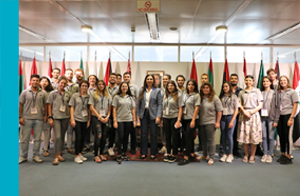
|
| |
|
|
| |
|
|

|
The role of renewable energy in women empowerment
Within the framework of the “Regional Initiative for Promoting Small-Scale Renewable Energy Applications in rural areas of the Arab Region (REGEND), ESCWA, in partnership with the International Network on Gender and Sustainable Energy (ENERGIA), organized on 30-31 July a national meeting on “Women Empowerment and Entrepreneurial Development in the Rural Context: The Role of Renewable Energy” at the UN House in Beirut.
The meeting was attended by local, regional, and international gender and renewable energy partners, experts, and stakeholders who shared their experiences from their respective countries along with the associated challenges, solutions, and opportunities. In addition, REGEND’s gender consultants presented their gender assessments conducted in Jordan, Tunisia, and Lebanon.
The meeting concluded with recommendations to mainstream gender equality and human rights in policy planning, capacity-building and awareness-raising in rural areas which will also serve in developing REGEND’s planned capacity building programs and awareness-raising campaigns.
Read more
|
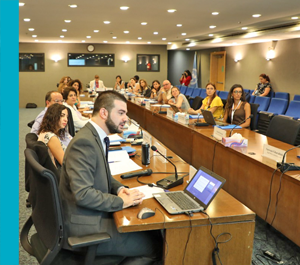
|
| |
|
|
 |
ESCWA services to UN regional entities
On 24 July 2019, ESCWA hosted an Introduction to Services and Products, during which the Administrative Services Division (ASD), as well as the Security section and the Communication and Information unit, showcased the services that they provide to a score of Head of Administration for Secretariat Entities as well as Agencies Funds and Programmes in Lebanon and the Region.
ESCWA provides a variety of services for over 40 United Nations entities operating in the region. The Regional Commission is committed to improving efficiency and raising the quality of services through streamlining and integrating delivery efforts and acting as a consolidated service centre.
The services available include conference, publishing and language support, budget and finance, operational support services in the areas of facilities management, travel and visa, property control and inventory, mail, archives and records as well as procurement.
This also covers human resources management services, Information and Communications Technology, medical services, outreach and media, as well as security and safety support.
Watch more
|
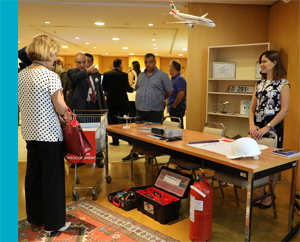
|
| |
|
|
| |
|
|

|
Tunis workshop on food security monitoring framework
A training workshop was organized by ESCWA in cooperation with FAO, the Arab Organization for Agriculture Development (AOAD) and the Arab Institute for Training and Research in Statistics (AITRS) in Tunis, from 29 July to 01 August.
It aimed to build the capacity of officials from the ministries of agriculture and national statistics offices from selected Arab countries on the use of an ESCWA-developed Food Security Monitoring Framework as well as ways to analyze the results and interpret them for policymaking.
The framework was developed by ESCWA in cooperation with AOAD and FAO and was adopted by the Executive Council of AOAD in March 2019. It aims to provide policy makers with statistical and visual information on the different dimensions of food security to facilitate the identification of pertinent areas for policy intervention. It is expected that participants will be able to train and disseminate the tool at the national level and assist in the collection of related data.
Read more
|
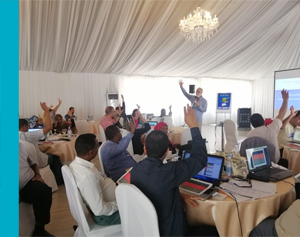
|
| |
|
|
| |
|
|
|

|
Did you know...
… that levels of violence and insecurity have a destructive impact on a country’s development?
War and violence expose population to terrible conditions such as death, violence, displacement and economic hardship. The effects of these phenomena go beyond the short term and affect every dimension of a person’s life.
In many countries of the Arab region, 70% of the population don’t believe that the law is applied equally among the population in their countries, according to opinion surveys.
In 2017, 1 in every 2 battle-related deaths registered worldwide took place in the Arab region. Of the 68.5 million forcibly displaced people in the world, 29 million – or more than 40% - were in Arab countries.
76% of the population in the Arab region believe that financial and administrative corruption is rampant in their countries.
Read more
|
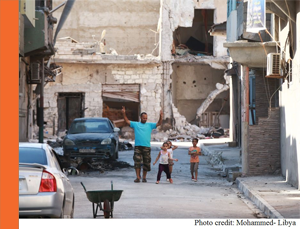
|
| |
|
|
|

